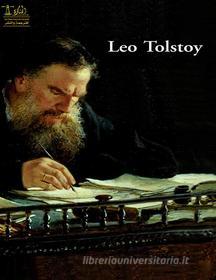
Ebook Complete Works of Leo Tolstoy: Text, Summary, Motifs and Notes (Annotated)
- EAN:
9783598301216
- Protezione:
- Nessuna
Descrizione Ebook Complete Works of Leo Tolstoy: Text, Summary, Motifs and Notes (Annotated)
Born to an aristocratic Russian family in 1828,[3] he is best known for the novels War and Peace (1869) and Anna Karenina (1877),[4] often cited as pinnacles of realist fiction.[3] He first achieved literary acclaim in his twenties with his semi-autobiographical trilogy, Childhood, Boyhood, and Youth (1852–1856), and Sevastopol Sketches (1855), based upon his experiences in the Crimean War. Tolstoy's fiction includes dozens of short stories and several novellas such as The Death of Ivan Ilyich (1886), Family Happiness (1859), and Hadji Murad (1912). He also wrote plays and numerous philosophical essays.
In the 1870s Tolstoy experienced a profound moral crisis, followed by what he regarded as an equally profound spiritual awakening, as outlined in his non-fiction work A Confession (1882). His literal interpretation of the ethical teachings of Jesus, centering on the Sermon on the Mount, caused him to become a fervent Christian anarchist and pacifist.[3] Tolstoy's ideas on nonviolent resistance, expressed in such works as The Kingdom of God Is Within You (1894), were to have a profound impact on such pivotal 20th-century figures as Mohandas Karamchand Gandhi,[5] and Martin Luther King, Jr.[6] Tolstoy also became a dedicated advocate of Georgism, the economic philosophy of Henry George, which he incorporated into his writing, particularly Resurrection (1899).
Origins
The Tolstoys were a well-known family of old Russian nobility who traced their ancestry to a mythical nobleman named Indris described by Pyotr Tolstoy as arriving "from Nemec, from the lands of Caesar" to Chernigov in 1353 along with his two sons Litvinos (or Litvonis) and Zimonten (or Zigmont) and a druzhina of 3000 people.[7][8] While the word "Nemec" has been long used to describe Germans only, back in the days it was applied to any foreigner who didn't speak Russian (from the word nemoy meaning mute).[9] Indris was then converted to Eastern Orthodoxy under the name of Leonty and his sons — as Konstantin and Feodor, respectively. Konstantin's grandson Andrei Kharitonovich was nicknamed Tolstiy (translated as fat) by Vasily II of Moscow after he moved from Chernigov to Moscow.[7][8]
Because of the pagan names and the fact that Chernigov at the time was ruled by Demetrius I Starshy some researches concluded that they were Lithuanians who arrived from the Grand Duchy of Lithuania, then part of the State of the Teutonic Order.[7][10][11] At the same time, no mention of Indris was ever found in the 14th – 16th-century documents, while the Chernigov Chronicles used by Pyotr Tolstoy as a reference were lost.[7] The first documented members of the Tolstoy family also lived during the 17th century, thus Pyotr Tolstoy himself is generally considered the founder of the noble house, being granted the title of count by Peter the Great

